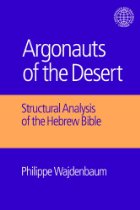 In my previous post presenting a few comments by social anthropologist Philippe Wajdenbaum from his thesis Argonauts of the Desert I quoted his summary conclusion of a Claude Lévi-Straussian structural analysis of the Bible:
In my previous post presenting a few comments by social anthropologist Philippe Wajdenbaum from his thesis Argonauts of the Desert I quoted his summary conclusion of a Claude Lévi-Straussian structural analysis of the Bible:
The Bible is a Hebrew narrative tainted with theological and political philosophy and inspired by the writings of Plato, one that is embellished with Greek myths and adapted to the characters and locations of the Near East. (p. 4)
To expand on that a little (with my own paragraph formatting and emphasis):
According to the results of my analysis, the Bible’s author(s) wanted to transpose — in the form of their own national epic — the Ideal State of Plato’s Laws, a political and theological project initiated in the Republic.
The biblical story, recalling the foundation of a twelve-tribe State that is endowed with divine laws which enable it to live ideally , seems to be inspired by Plato’s Laws, probably the least known to moderns of the philosopher’s dialogues. I will analyse all the similar laws between the two texts as well as their respective theologies, and will try to show that even biblical monotheism owes a debt to Plato.
To enhance this platonic utopia with narrative, the biblical author(s) used Greek sources — Herodotus serves as a source for myths and stories in ‘historical prose’. Then come the great Greek mythological cycles: the Argonauts, the Heraclean cycle, the Theban cycle and the Trojan cycle by such authors as Homer, Pindar and the Tragedians, whom I believe were sources of inspiration for the Bible. Its author(s) borrowed myths, split them up and transformed them according to need, yet traces were left, perhaps intentionally, of these borrowings.
In Genesis–Kings there exists an opposition between the twelve-tribe ideal State — a State governed only by laws, for which the plan is given by God to Moses and which is founded by Joshua — and the monarchy. The monarchy of the nations in Genesis and Exodus, and that of Israel in the books of Samuel and Kings, is one whose excesses will first bring Israel to division, and then to its eventual downfall.
The biblical story from Genesis to Kings is a coherent and unified literary work that can be analysed by itself — as Jacques Cazeaux does — without referring to the alleged sources of the texts, regardless of whether they be ‘Yahwist’ or ‘Elohist’, as the documentary hypothesis posits, or even Greek, as in my view. Whatever its sources and dating may be, the Bible is first and foremost a collection of books — extremely well written, and too rarely read! (p. 4)
I look forward to sharing a few of the details underpinning the above outline in future posts.
Anyone who has read ancient Greek literature and has been struck by the frequency with which they hear echoes of a line or episode in the Bible will, I believe, begin to find their curiosity whetted and satiated as they begin to read Wajdenbaum’s anthropological insights into the structural analysis of myths. (I also believe it is only a matter of writing another chapter to apply the same to the Gospels, but that’s just my view.)
But back to the expected response to such a thesis and Wajdenbaum’s approach and justifications:
